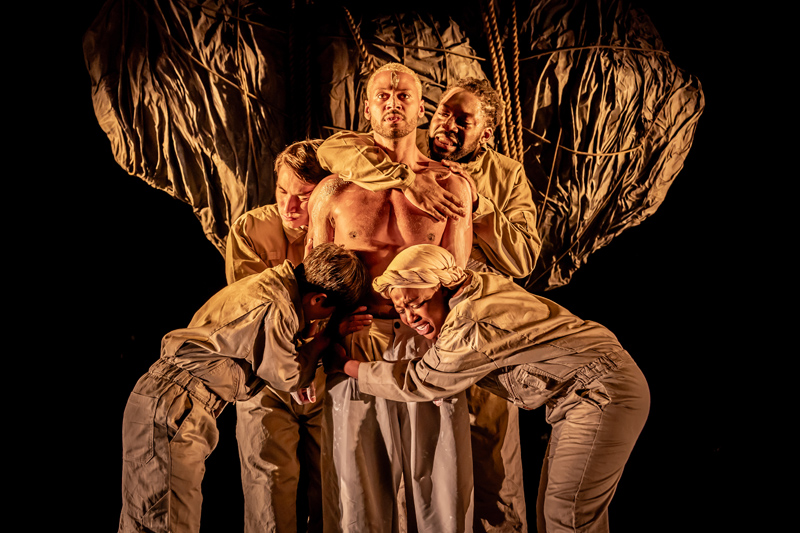“Mlima’s Tale” at Kiln Theatre
Neil Dowden in north London
28 September 2023
It seems that American playwright Lynn Nottage is finally getting the recognition she is due in this country. She is the only woman to have won the Pulitzer Prize for Drama twice, for her plays Ruined and Sweat, the latter being staged by the Donmar Warehouse in 2018 before transferring to the West End. Her latest play Clyde’s will be given its European premiere at the Donmar next month. She also wrote the books for the musicals The Secret Life of Bees which was seen at the Almeida earlier this year and MJ the Musical which opens in the West End next spring. Now the Kiln Theatre presents the UK premiere of her 2018 play Mlima’s Tale, a devastating exposé of the iniquities of the international ivory trade.

The cast. Photo credit: Marc Brenner.
We see the elephant Mlima (Swahili for mountain) – one of the few remaining “Great Tuskers” whose tusks are so large they touch the ground – at the end of his life when he is brutally murdered in a Kenyan game park, and then as a ghost haunting the people who are complicit in his death. As one of his Somali killers says, “If you not give elephant proper burial he’ll haunt you forever.”
In a daisy-chain structure like Schnitzler’s La Ronde, with each scene connected in turn by a reappearing character, Mlima invisibly follows poachers, wardens, officials, businessmen, artisans, retailers, and customers, while still making his presence felt as he marks those involved in the greed and corruption of ivory trafficking.
In a moving, lyrical opening monologue Mlima describes free-roaming elephant life on the savannah and his mythic ancestral heritage (his grandmother has told him, “if you really listen, our entire history is on the wind”). But this is all about to be cut short in the most savage way as he writhes in agony from a poisoned arrow before a poacher butchers him with an axe, chopping of his majestic tusks as trophies. Mlima’s last words (repeated in a brief epilogue at the end) are to warn his kin, “Don’t come to mourn me. RUN!”
But Mlima’s proud spirit presides over the rest of the play as he streaks with ivory paint the various members of the supply-and-demand network that make him and his like targets. A poacher is double-crossed by the chief of police who has licensed the killing, as threats turn to bribes when the policeman tries to convince his suspicious warden nephew to keep quiet, with the warden then agreeing to give the director of wildlife a positive PR spin that offloads the blame onto government officials. A Tanzanian trader sets up the illicit export of the ivory on board a ship with an American flag which ends up – via a venal customs officer and hypocritical carver in Vietnam – as a sculpture in a flashy penthouse apartment in Beijing.

The cast. Photo credit: Marc Brenner.
Nottage’s approach may well be anthropomorphic but Mlima’s Tale is a beautifully written work that packs an emotional punch with regard to mankind’s ongoing destruction of the natural world, as well as being a clinical dissection of the capitalistic economic model that encourages these atrocities.
Miranda Cromwell’s elegant, focused production is not over-elaborate (though a mini-revolve is only fitfully used so could easily be dispensed with), eschewing puppetry or video in favour of cutting directly to the heart of the story. Amelia Jane Hankin’s set design features a bronze-coloured stage, a suspended elephant head, and translucent curtains that are imaginatively used to link scenes, with Amy Mae’s back lighting silhouetting menacing figures. Femi Tomowo’s African-style music (including stirring songs performed live) add much to the ambience, as does Emma Laxton’s evocative sound design incorporating the noises of the savannah.
The production has five actors rather than the four used when the play was first staged in the States. As Mlima, the bare-chested, muscular Ira Mandela Siobhan makes a powerfully dignified impact, speaking only at the beginning and end, but magnificently embracing the physicality of the role – including elephant dance choreographed by Shelley Maxwell – as he uses his outstretched arms to suggest tusks and conveys intense listening with the whole of his body while sticking closely to the guilty. Gabrielle Brooks, Brandon Grace, Natey Jones, and Pui Fan Lee all excel in doubling and differentiating the array of other roles with quick costume changes – all playing their parts as cogs in the ruthless machine of exploitation.









